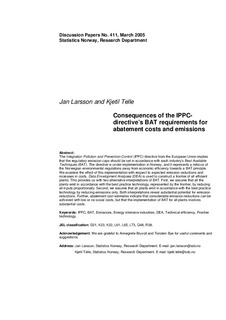Consequences of the IPPC-directive’s BAT requirements for abatement costs and emissions
Working paper

Åpne
Permanent lenke
http://hdl.handle.net/11250/180953Utgivelsesdato
2005Metadata
Vis full innførselSamlinger
- Discussion Papers [1003]
Sammendrag
Abstract:
The Integration Pollution and Prevention Control (IPPC) directive from the European Union implies
that the regulatory emission caps should be set in accordance with each industry’s Best Available
Techniques (BAT). The directive is under implementation in Norway, and it represents a refocus of
the Norwegian environmental regulations away from economic efficiency towards a BAT principle.
We examine the effect of this implementation with respect to expected emission reductions and
increases in costs. Data Envelopment Analyses (DEA) is used to construct a frontier of all efficient
plants. This provides us with two alternative interpretations of BAT. First, we assume that all the
plants emit in accordance with the best practice technology, represented by the frontier, by reducing
all inputs proportionally. Second, we assume that all plants emit in accordance with the best practice
technology by reducing emissions only. Both interpretations reveal substantial potential for emission
reductions. Further, abatement cost estimates indicate that considerable emission reductions can be
achieved with low or no social costs, but that the implementation of BAT for all plants involves
substantial costs.
Keywords: IPPC, BAT, Emissions, Energy intensive industries, DEA, Technical efficiency, Frontier
technology.
Utgiver
Statistics Norway, Research DepartmentSerie
Discussion Papers;No. 411Beslektede innførsler
Viser innførsler beslektet ved tittel, forfatter og emneord.
-
The impacts of alternative policy instruments on environmental performance. A firm level study of temporary and persistent effects
Bye, Brita; Klemetsen, Marit Elisabeth (Discussion papers;788, Working paper, 2014-10)We study the effects of various environmental regulations on environmental performance measured as emission intensity. Moreover, we aim to test whether any such effects are persistent or only temporary. Conventional theory ... -
The welfare effects of carbon policies: grandfathered quotas versus differentiated taxes
Bye, Brita; Nyborg, Karine (Discussion Papers;No. 261, Working paper, 1999)Recently, it has been demonstrated that pre-existing distortionary taxes can substantially increase the costs of market-based instruments which do not raise revenue, such as non-auctioned emissions quotas. Revenue-raising ... -
Labour market rigidities and environmental tax reforms : welfare effects of different regimes
Bye, Brita (Discussion Papers;No. 242, Working paper, 1998)The working of the labour market is important for the total welfare effects of tax reforms. This paper analyses, by using a computable general equilibrium model for the Norwegian economy, how different assumptions about ...